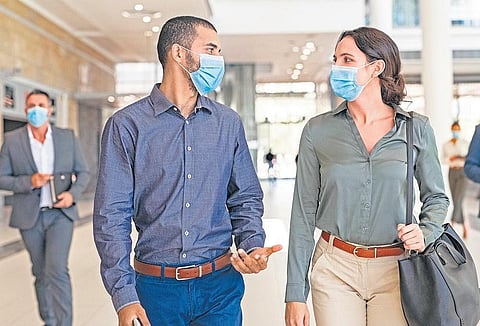

Marketing professional Naina Gupta landed a coveted job in a tech startup last year. She considered herself exceedingly fortunate, as the pandemic had brought a pay cut for her husband and deprived some friends of jobs altogether. Though shy at first, she found it easy to slip into a virtual camaraderie with her small team who met on Zoom every day and conducted tasks on email and phone calls. However, when her office asked employees to come in on a rotational basis starting early August, she felt acutely unprepared. Gupta explains, “I felt as jittery as I had on the first day of college.
It’s one thing to see a head on a screen and completely another to meet them in real life and interact! I know it sounds childish, but I was afraid of people judging me for being too short or plump or devoid of personality.” However, she is glad that she has started going. “It was an odd feeling at first, but it was also a collective awkwardness—many of us were shorter, taller, different-looking than what we had imagined, and after the initial discomfort, we fell into a consistent work rhythm,” she adds.
Gupta’s case is not an isolated one. As people return to work and meet co-workers for the first time or after a long gap, they find themselves coming to terms with the virtual impressions they have formed of each other. A person’s physical appearance should ostensibly have no effect on professional dealings, but human nature dictates otherwise.
“Whether it’s for online dating, applying for jobs via email, or setting up meetings on phones, people often form first impressions online.Unfortunately, working remotely leaves no scope to ‘change’ that virtually formed judgment,” says Shaifila Ladhani, a psychotherapist based in Delhi.
She further explains that the impressions we form of people affect our behaviour towards them. Her observations ring true in the case of Rajesh Sen, who recalls an incident from last year. As a freelance voice artist, he had been virtually conversing with and cajoling a potential client for weeks. When they finally met for an informal coffee, he was surprised to see his client’s diminutive stature. Despite being of average Indian height, Sen towered over the other, which led to a perceptible shift in power dynamics and allowed him to crack the deal.
While some are surprised at the appearance of others, a few are preoccupied with their own fear of being judged. Sana Jha, a teacher in a prominent Mumbai school, had put on quite a few lockdown kilos. Feeling self-conscious, she dreaded going back to her workplace when the school opened for certain year groups. Sana is one of many that felt that way, as pandemic weight gain was the most common issue faced by people around the world. A cohort analysis, published in PubMed, of 100 participants conducted during 49 days of lockdown in India, recorded weight gain in 40 percent of people.
Ladhani explains this insecurity, “Our first impressions are influenced by a number of factors, such as facial shape, vocal inflection, attractiveness, and general emotional state. We tend to get attached to the initial impressions of others and find it very difficult to change our opinion, even when presented with lots of evidence to the contrary. Imagine we have a set of big boxes in our mind. Each box has a ‘trait’ as a marker, and if a person fits a particular trait, we fit them in a box. This is how biases are formed.” Sometimes, these biases are based on completely false premises.
Software professional Jasjeet Singh was looking forward to meeting the new office entrant Priyanka, whose soft lilting voice attracted him on the phone. However, when they finally met face-to-face, he was taken aback to see that she looked nothing like he had pictured!
Dressing for work has also changed significantly after a year spent in pyjamas and shorts. A survey conducted by LinkedIn News India indicates that 45 percent people prefer wearing smart casuals to work over the formals they chose pre-pandemic, leading to further change in professional interactions.
In light of these psycho-social dilemmas, Ladhani questions the efficacy of hybrid work-models going forward. Interpersonal relationships have evolved to suit virtual functionality over the last couple of years, and will need to evolve further to suit hybrid forms of professional interaction. Whatever the future of work may be, let’s hope it doesn’t entail traversing personal boundaries.
TIPS TO DEAL WITH RETURN-TO-OFFICE ANXIETY
✥ Talk to your employer and assess if it’s possible to have a trial period before completely returning to work
✥ Self-analyse the reason for your anxiety, so you are able to address it appropriately
✥ Attempt to socialise with small groups of co-workers to ease into the office set-up
✥ Focus on the positive aspects of returning to work, such as returning to a feeling of normalcy and better productivity at work
✥ Indulge in self-care and relaxation techniques while you readjust to the new working environment
✥ Initiate small group breaks to encourage banter
and ease your tension
✥ Suggest the idea of conducting meetings outdoors to help with co-worker bonding
“We tend to get attached to the initial impressions of others and find it very difficult to change our opinion, even when presented with lots of evidence to the contrary.”
Shaifila Ladhani, Psychotherapist, New Delhi